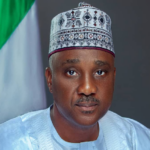
Last Tuesday, about 35 members of the House of Representatives considered and adopted the report of their Committee on Electoral Matters and Political Parties’ Affairs, where they made some far-reaching amendments to the Electoral Act, 2010, which, if assented to, would change the country’s election sequence, among other issues. Our correspondent, who attended the session where the decision was taken, writes.
Our correspondent observed that about 35 members of the House were present at the beginning of the consideration of the report, presided over by Deputy Speaker Yussuf Suleiman Lasun.
This appears to be against the Standing Orders set by the lawmakers, which state that they must form a quorum of one-third of the 360 members before any decision can be taken.
This will mean that there should be at least 120 members seated before a quorum can be formed.
Order 4, Rule 1 of the House provides that, “The quorum of the House shall be one-third of all the members of the House.
Rule 2 of the same Order 4 provides that: “If any member draws the attention of the Speaker to the fact that a quorum of the House is not present, or if, from the number of members taking part in a division, including those members who declined to vote, it appears that a quorum is not constituted, the Speaker shall cause members to be summoned as if for a division. At the expiration of 15 minutes from such order, the Speaker shall count the House and, if a quorum is not then constituted, shall adjourn the House forthwith.”
In the case of report consideration, it is done at the Committee of the Whole House, where the Deputy Speaker presides.
Order 4, Rule 3, which is on quorum for the Committee of Whole, provides that, “If notice be taken in a Committee of the Whole House that a quorum is not present, the chairman shall follow the course pursued by the Speaker in accordance with paragraph (2) of this Rule.
“If he ascertains that less than one-third of all the members are present, the chairman shall leave the Chair, and the House shall be resumed; whereupon the Speaker shall count the House. If a quorum is then present, the House shall again resolve itself into committee, but if a quorum is not present, the Speaker shall adjourn the House forthwith.”
Some of those present included Kingsley Chinda; James Faleke; Tajudeen Yusuf; Ismaila Gadaka; Mohammed Gololo; Aishatu Dukku; Mohammed Tahir Monguno; Chukwuka Onyema; Simon Arabo; Betty Apiafi; Babajimi Benson; Edward Pwajok; Henry Nwawuba; Samuel Ikon; Mohammed Musa Soba; Boma Goodhead; Nkeiruka Onyejeocha; Victor Nwokolo; Prestige Ossy; Pat Asadu; Uche Nnamobi; Ken Chikere; Zakari Angulu; Benjamin Wayo; Alexander Kolawole; Jones Onyereri and Sunny Egbenyi.
Others who were present but later left were; Yusuf Bala Ikara; Razak Atunwa; Sergius Ogun; Dagomie Abiante; Alhassan Ado Doguwa and Gabriel Onyewife.
There were few other lawmakers present on the floor, whose identities could not be immediately ascertained. Others left before the consideration started.
Our correspondent reports that most of the lawmakers usually leave the chamber as soon as the House resolves into the Committee of Whole to consider reports.
CISLAC reacts
In his reaction, the executive director of the Civil Society Legislative Advocacy Centre (CISLAC), Auwal Musa Rafsanjani, said in the first place, the Independent National Electoral Commission (INEC), by our law, is empowered to draw timetable and ensure proper regulation on how political parties and their candidates comply with the Electoral Act.
Rafsanjani, who is also the head of Transparency International in Nigeria, said it was unfortunate that the lawmakers did not pay attention to the rules they set for themselves on how to form a quorum that can take a legislative decision.
“This is a very serious concern, because when it comes to the issue of amendment of any law, it requires that at least the House should have a quorum for such kind of important legislation to happen.
“But by the time this amendment took place at the plenary session, only about 35 members of the House were actually there. This is a serious issue even without looking at the items or matters that they touched within the period, which is about changing the elections timetable that INEC has already released.
“They didn’t even have the required number of members to deliberate on this kind of important national issue. I think that alone would have raised a serious concern on their action.
“In view of the fact that there was no proper quorum to pass that kind of amendment and the fact that the House doesn’t have that kind of constitutional and legislative powers, to tinker or draw timetable for INEC, it is important that we call on the Executive not to assent to this kind of amendment.
“I’ll suggest that both the House and the Senate reconsider the matter and allow INEC to carry out its responsibilities irrespective of the fact that some of the legislators may want to re-contest. Once you have electoral value, the people will vote for you, but not to maneuver your way. That will amount to electoral fraud.
“Secondly, there’s already a court judgement regarding the powers of the National Assembly when it comes to the issue of guidelines and timetable for elections. This is a complete deviation from what the court said.
“It is not within the legislative and constitutional powers of the National Assembly to tinker with the timetable as released by the INEC. The constitution is very clear. The role of the legislature is to make laws regarding the electoral process, but the guidelines and timetable is within the powers of INEC.
“So, it’s important that the legislature restricts itself to the powers given to it by the constitution. Tempering with the election dates as released by the INEC has constitutional implications. In any case, there’s a judgement by the Supreme Court regarding this kind of situation.”
The amendments
The report of the committee was presented by the chairperson, Aishatu Jibril Dukku (APC, Gombe). In the amendments done by the House, elections into the office of Nigeria’s president is to come last in the sequence of general elections to be held in the country.
Also, elections into the 109 Senate and 360 House of Representatives seats will come first in the sequence, to be followed by the governorship and state assembly elections.
The current practice as set by the Independent National Electoral Commission is in such a way that presidential and National Assembly elections are held first on the same day, while those of governors and members of the state houses of assembly are held later also on the same day.
Another major amendment the lawmakers made to the Electoral Act, 2010 was to raise the campaign fund for presidential candidates from N1billion contained in the Act to N5bn and that of a governor from N200 million to N1bn.
The amendment provides that Section 25 of the Electoral Act be substituted with a new Section 25 as thus: “25 (1) Elections into the offices of the president and vice president, the governor and deputy governor of a state, and to the membership of the Senate, the House of Representatives and Houses of Assembly of each state of the Federation shall be held in the following order: “(a) National Assembly election, (b) State Houses of Assembly and governorship elections (c) presidential election.”
“The dates for the above stated primaries shall not be held earlier than 120 days and not later than 90 days before the date of elections to the offices.”
Similarly, an amendment to Section 92 (2) provides that the N1billion limit of expenses to be incurred by a presidential candidate be raised to N5bn, while Section 92 (3) is amended to substitute the figure N200m with N1bn as expenses for a governorship candidate.
Another amendment to Section 36 will allow a running mate to candidate that dies before the conclusion of an election to inherit the votes of a dead candidate.
A new Section 36 (3) states that: “If during the commencement of the poll but before the conclusion of the elections for the office of the president or governor of a state, one of the nominated candidates of a political party dies, the commission shall allow the running mate, that is the party’s vice presidential candidate or deputy gubernatorial candidate to continue and conclude the poll, and should he score the majority of the votes cast in accordance with the constitution, be declared the winner of the said election.”
Also, the House amended Section 35 and provided that if a candidate dies before an election, they would be replaced by the next contestant with the highest votes.
The new subsection states that: “Where a nominated candidate dies in the circumstances stated under subsection (1) of this section, the next person, from the same political party where the deceased emerged, with the second highest votes in the primary election, shall be submitted to the commission to replace the deceased, and the commission shall accept such replacement as if the deceased is alive”
In Section 143, there is a new subsection (3) providing that, “Where the nomination of an elected candidate is nullified by the court and notice of appeal against the decision is given within the stipulated period for appeal, the elected candidate shall, notwithstanding the contrary decision of the court, remain in office pending the determination of appeal.
“If the court determines that the candidate was not validly nominated, the elected candidate shall, notwithstanding the contrary decision of the court remain in office within the period an appeal may be filed; and shall not be sanctioned for the benefits derived while in office, pursuant to this section.”
Why we did the amendments – Rep Soba
A member of the House from Kaduna State, Mohammed Musa Soba said they decided to carry out the amendment on the elections sequence in order for candidates to win elections on their own.
“The whole essence is to go back to what obtained long ago. The president is the father of the land. Most of the time, people would only come out to vote for president and they won’t come out for subsequent elections.
“It is now two elections in one for members of the two chambers of the National Assembly; two in one for governors and members of state assemblies, and then that of the president is for him alone.
“We want everybody to win on merit. All candidates vying for political offices will not have to rely on themselves, not on the popularity of anybody else to win.
“In most cases, once you conduct the presidential election first, people won’t come out to vote again, especially when their candidate doesn’t win.”



